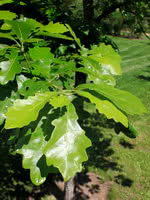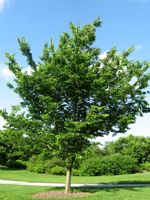Mon-Fri 9am - 5pm Mountain time
Bur Oak vs Common Hackberry
Quercus macrocarpa
Celtis occidentalis
Bur Oak has a wide distribution but is one of the only oaks that will grow well on the prairies. Bur Oak produces deeply lobed, dark green leaves that turn golden yellow to brown in the fall.
Its acorns are round and half enclosed by a mossy fringed cup.
Although slower growing, this long lived tree eventually becomes a popular large ornamental tree for driveways, parks, and the front of industrial buildings. Popular as a memorial or dedication tree.
Note: Most Oak species can be considered toxic for many animals.
The Common Hackberry is a medium-sized deciduous tree that resembles the American Elm but is immune to Dutch Elm Disease. They are versatile and can adapt to a variety of growing conditions.
It produces purple-red, berry-like fruit with a large seed in the center. Both the sweet flesh, which tastes similar to dates, and the crunchy seed are edible. The fruit remains on the tree throughout the winter, offering a valuable food source for birds and other wildlife.
The Common Hackberry can also be a great addition to a pollinator garden. The tree itself is a host for the larvae of several butterfly species and the flowers provide a source of pollen and nectar.

